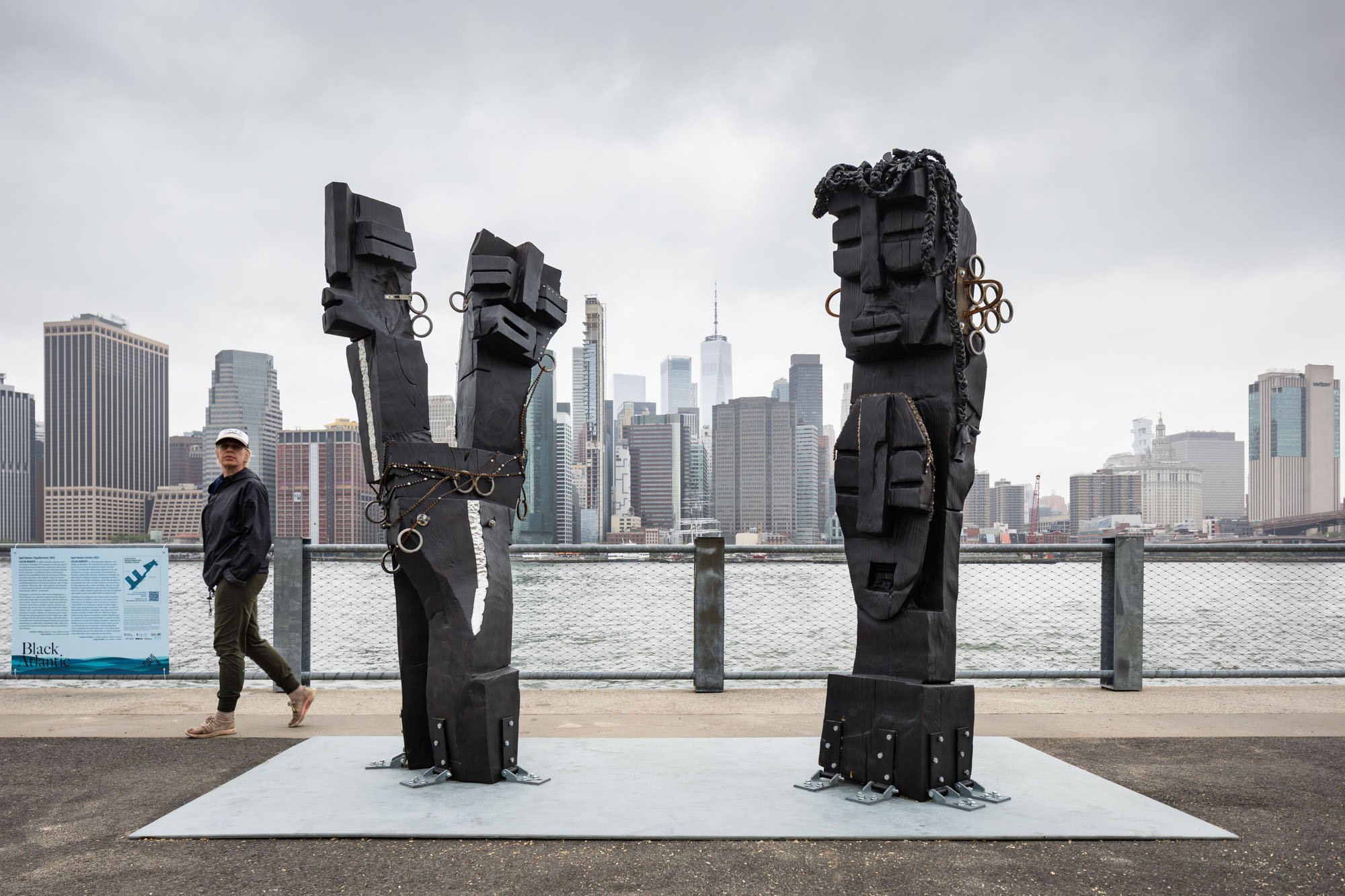
In the mid-1600s, Brooklyn’s East River was a bustling hub of commerce and an integral part of the network that linked Africa and Europe with the Americas and the Caribbean. It served as a shipping port, maritime harbor, and ferry landing with “finger piers” jutting from the shore where warehouses were built for storage.
Now, the historic area is the site of a group exhibition titled “Black Atlantic,” presented by the Public Art Fund and co-curated by artist Hugh Hayden.
The title of the show is taken from Paul Gilroy’s book Black Atlantic: Modernity and Double Consciousness. Like the book, the show is intended to “illustrate a counterpoint to a monolithic perception of Blackness, and is reflective of the multitude of ways in which individuals can create a new vision within the context of American culture that is expansive, malleable and open to all.”
The five artists included in the show—Leilah Babirye, Hugh Hayden, Dozie Kanu, Tau Lewis, and Kiyan Williams—are all roughly of the same generation, their distinct experiences inform a wide range of identities, all of which come through in their sculptural commissions.
Babirye’s hulking nine-foot-tall sculptures titled Agali Awamu (Togetherness) are made from hollowed tree trunks fused with found objects and welded metal, creating the effect of Transformer-like totems harkening back to the artist’s East African upbringing. Babirye fled her native Uganda to escape homophobic persecution, and the black-colored monumental sculptures, which echo the high-rise architecture of New York City, represent “a chosen, queer family, whose visibility in public space is a beacon of empowerment.”
Williams’s work, Ruins of Empire, reflects on the surrounding landmarks, specifically the Statue of Liberty and its forebear in Washington, D.C., the Statue of Freedom, which was erected and constructed by enslaved people during theCivil War. Williams’s vision is partially buried in the ground, a relic of American idealism, which is inextricably linked to subjugation.
Below, see pictures of all the artworks included in “Black Atlantic” at Brooklyn Bridge Park. The show is on view through November 27, 2022.
Tau Lewis, We pressed our bellies together and kicked our feet, we became something so alien that we no longer had natural predators; We watched humankind evolve as we absorbed into the sea floor, the moon stared down at us and told us the Earth had a heavy heart; We wondered if the angels had abandoned us, or if they simply changed shape without letting us know. Every night creatures vanished, every morning strangers would arrive, (all 2022). Courtesy of the artist and Night Gallery. Photo: Nicholas Knight. Courtesy of Public Art Fund.
Leilah Babirye, Agali Awamu (Togetherness) (2022). Courtesy of the artist, Robichaux, NY, and Stephen Friedman Gallery, London. Photo: Nicholas Knight, Courtesy of Public Art Fund NY.
Dozie Kanu, On Elbows (2022). Courtesy of the artist and Project Native Informant, London. Photo: Nicholas Knight. Courtesy Public Art Fund.
Hugh Hayden, The Gulf Stream (2022). Courtesy of the artist and Lisson Gallery. Photo: Nicholas Knight, Courtesy of Public Art Fund, NY.
Hugh Hayden, The Gulf Stream (2022). Courtesy of the artist and Lisson Gallery. Photo: Nicholas Knight, Courtesy of Public Art Fund, NY.
Tau Lewis, We pressed our bellies together and kicked our feet, we became something so alien that we no longer had natural predators; We watched humankind evolve as we absorbed into the sea floor, the moon stared down at us and told us the Earth had a heavy heart; We wondered if the angels had abandoned us, or if they simply changed shape without letting us know. Every night creatures vanished, every morning strangers would arrive, (all 2022). Courtesy of the artist and Night Gallery. Photo: Nicholas Knight. Courtesy of Public Art Fund.
Kiyan Williams, Ruins of Empire (2022). Courtesy of the artist. Photo: Nicholas Knight, Courtesy of Public Art Fund, NY.
Leilah Babirye, Agali Awamu (Togetherness) (2022). Courtesy of the artist, Robichaux, NY, and Stephen Friedman Gallery, London. Photo: Nicholas Knight, Courtesy of Public Art Fund NY.
Dozie Kanu, On Elbows (2022). Courtesy of the artist and Project Native Informant, London. Photo: Nicholas Knight. Courtesy Public Art Fund.